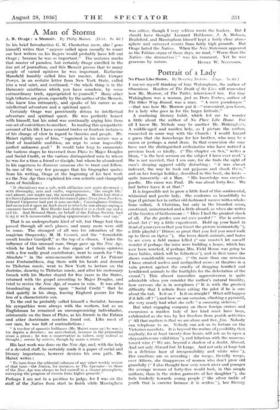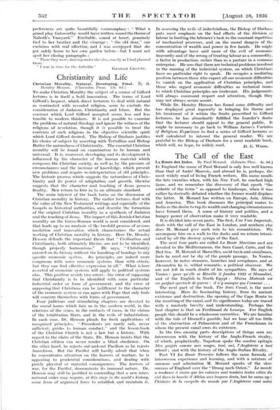Portrait of a Lady
No Place Like Home. By Beverley Nichols. (Cape. 7s. 6d.) I FOUND myself thinking of Guy Walsingham, the author of Obsessions. Readers of The Death of the Licm will remember how Mr. Morrow, of The Tatter, interviewed her. For Guy Walsingham was a woman, just . as Dora Forbes, author of The Other Way Round, was a man. " A mere pseudonym 7 —that was how Mr. Morrow put it—" convenient, you know, for a lady who goes in for the larger latitude."
A confusing literary habit, which led me to wonder a little about the author of No Place Like home. For all I know Mr. Nichols may be another Mr. Walsingha:n. A middle-aged and maiden lady, so I picture the author, connected in some way with the Church : I would hazard a guess that she housekeeps for her brother, who may be a canon or perhaps a rural dean. In that connexion she may have met the distinguished ecclesiastics who have noticed a previous book so kindly. (" The chapter on Sex," writes a Dean, " is the best sermon on the subject I have ever read.") She is not married, that I am sure, for she finds the sight of men's sleeping apparel oddly disturbing : " it was almost indecent, the way he took out pyjamas and shook them," and on her foreign holiday, described in this book, she hints-- quite innocently—at a Man. " His knowledge was encyclo- paedic. His name was Paul. He was about forty-five. We had better leave it at that."
It is impossible not to grow a little fond of this sentimental, whimsical and poetic lady. She conforms so beautifully to type (I picture her in rather old-fashioned mauve with a whale- bone collar). A Christian, but only in the broadest sense, emotional, uninstructed and a little absurd, as when she writes of the Garden of Gethsemane : " Here I had the greatest shock of all. For the garden was not even weeded ! " She is- serious about Art (" try a little experiment. Hold up your -hand in front of your eyes so that you bisect the picture horizontally "), a little playful (" Dfirers so great that you feel you must walk up to them on tiptoe "). She loves dumb animals, and hates to see even a field mouse killed (" one mustn't let oneself wonder if perhaps the mice were building a house, which has now been wrecked, if perhaps Mrs. Field Mouse was going to have babies, which will be fatherless"), and in their cause she shows considerable courage. (" On more than one occasion I have created useless and undif,mified scenes at theatres in a vain protest against the cruelty of dragging terrified and bewildered animals to the footlights for the delectation of the crowd.") This almost masculine aggressiveness is quite admirable when you consider the author's natural 'timidity, how nervous she is in aeroplanes (" It is with the greatest difficulty that I refrain from asking the pilot if he is sure about the tail. Is it on ? Is it on straight? What will happen if it falls off ? ") and how on one occasion, climbing a pyramid, she very nearly had what she calls " a swooning sickness."
But what engaging company on these foreign cruises and excursions a maiden lady of her kind must have been, exhilarated as she was by her freedom from parish activities (" All that matters is that we are alone and free, free. Nobody can telephone to us. Nobody can ask us to lecture on the Victorian novelists. It is beyond the realms of Possibility that anybody, for at least twenty-four hours, will ask us to open a chrysanthemum exhibition "), and hilarious with the unaccus- tomed wine (- We are, beyond a shadow of a doubt, Abroad. And not only Abroad but At Large. And not only at large but in a delicious haze of irresponsibility and white wine "). Her emotions arc so revealing : she weeps, literally weeps, over Athens, she disapproves of women who don't grow old gracefully (" I also thought how very much nicer and younger the average woman of forty-five would look, in this simple Uniform, than in the stolen garments of her daughter "), she feels tenderly towards young people (" the silver treble of youth that is sweeter ter because it is- sexless "), her literary
preferences are quite beautifully commonplace : " What a
grand play Galsworthy would have written round the theme of Naboth's Vineyard." Excitable, sound at heart, genuinely tied to her brother and the vicarage : ".tile old dear," one
exclaims with real affection, and I was overjoyed that she got safely home to her own garden before—but I must not spoil her closing paragraphs : " There they were, dancing under the elm, exactly as I had planned them.
" 1 was in time for the daffodils."
GRAHAM GREENE.







































 Previous page
Previous page